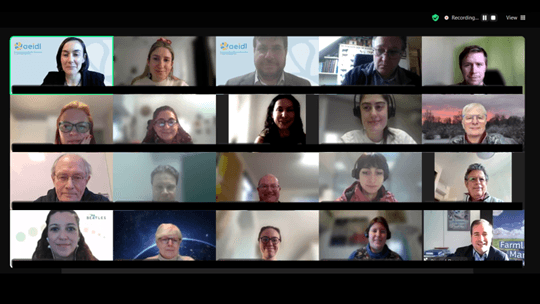On February 17th, 2025, the BEATLES project held its third webinar, co-organised with the GOOD and PRUDENT projects, under the theme “Adoption of Sustainable Agriculture: From the Producer to the Consumer.”
Led by Q-PLAN International (BEATLES), in collaboration with the Burgundy School of Business (GOOD), and the Association of Balkan Eco-Innovation (PRUDENT), the event brought together 65 participants, including researchers, policymakers, and industry experts.
Discussions centered on advancing sustainable agriculture across Europe and strengthening the connection between producers and consumers to build resilient, climate-friendly food systems.
Key Presentations
Tove Christensen (University of Copenhagen) shared key findings from the BEATLES behavioural experimenton consumers’ willingness to pay (WTP) for climate-friendly food. Conducted across the project’s five use cases, the study revealed that consumers showed a modest WTP for climate-friendly carrots. However, WTP increased slightly when CSA information was provided—especially when paired with social norm messaging. The study also highlighted a lack of trust in eco-labels as a barrier to greater consumer engagement.
Marcel Kornelis, (WUR) from BEATLES, presented the project’s consumer segmentation study which explores how climate concerns influence food choices and whether consumers are willing to pay extra for CSA-produced foods. His presentation provided insights into the consumer typology methodology, categorizing consumers into three groups: Sustainable Buyers, Price-Sensitive Buyers, and Non-Sustainable Buyers, describing their characteristics.
Lara Agnoli and Effrosyni Vasileiou, (BSB) shared insights from the GOOD project on drivers and barriers in the adoption of agroecological week management (AWM). They explained the concept of AWM means and presented findings from a survey exploring farmer segments and the impact of nudges on adoption behavior. The results indicated that farmers are willing to reduce herbicide use and view agroecological practices as a concrete strategy for achieving this goal. However, informational nudges influence short-term AWM adoption but may deter action by shifting immediate responsibility to farmers. Their impact varies by socio-demographic factors and the farming system.
Francesca Romana Barba, (University of Trento) from the Prudent project, explored farmers’ acceptability and perceived efficacy of green nudges to foster more sustainable production patterns. She examined behavioural changes through nudging techniques, focusing on the project’s Use Cases from different European countries. Key findings reveal that while reminders about sustainability are widely accepted, information on others’ behaviour is less effective. The study suggested further research on factors influencing farmers’ preferences and real-world testing on these nudging tools.
Nikos Georgantzis, (BSB) provided an overview of a new EU Horizon project — ForestAgriGreenNudge, aiming to guide decision-makers towards more sustainable practices in farming and forestry through the use of “Green Nudge”—subtle, positive interventions that reshape decision-making environments.


